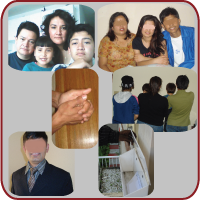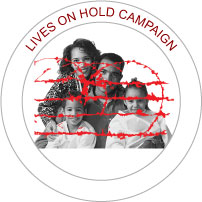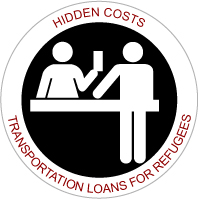CONTENTS:
- Now is the Time to Stand Up for Refugees and Immigrants
- Visas required for people from the Czech Republic and Mexico
- Government lifts moratoria on removals to Burundi, Liberia and Rwanda
- Extension of the Canada-US Safe Third Country Agreement
- Join the campaign to end transportation loans for refugees
- Come to the CCR Summer Working Group meetings, 11-12 September 2009, Montreal
- Faces of the CCR: Send your suggestions
- New from the CCR
- Practical Information: Factsheet for nationals of Burundi, Liberia and Rwanda without permanent status in Canada
- In the Media: News articles on refugee and immigration issues
- Stand Up for Refugees! A call to all Canadians
- Talking Points: The challenge of fair and effective refugee determination
- Follow the CCR on Facebook and Twitter
-----
 Over the summer, we have seen dramatic attacks on refugees, and on the notion that Canada should have strong refugee protection policies. A number of restrictive measures have already been implemented, and more are promised. Government discourse seems designed to provoke a public backlash against refugees and the refugee protection system.
Over the summer, we have seen dramatic attacks on refugees, and on the notion that Canada should have strong refugee protection policies. A number of restrictive measures have already been implemented, and more are promised. Government discourse seems designed to provoke a public backlash against refugees and the refugee protection system.
The government has been turning its back on refugees by:
- Introducing measures that deny access to 40% of claimants (visa requirements on Mexico and Czech Republic, and new broadening of the application of the Safe Third Country Agreement to nationals of moratoria countries).
- Proposing a refugee reform that would make the refugee determination system significantly less fair and more restrictive, compromising Canada’s obligations to protect refugees.
- Talking about refugees in a way that fosters hostility towards refugee claimants and undermines public confidence in the refugee protection system.
The Canadian refugee system does need improvements, but its core elements, considered a model internationally, need to be safeguarded. Among those core elements is a commitment to treating claimants with dignity and to providing a fair process to determine whether they need protection.
Key components in a fair refugee determination system include:
- Fully independent and qualified decision-makers, working within a quasi-judicial tribunal.
- The examination of each claim on its individual merits, with no compromise of procedural guarantees based on group characteristics such as country of origin.
- An appeal on the merits.
Canadians who care about refugees need to protest this closing of the door on refugees. You can help this effort by:
1. Broadening opposition to the anti-refugee measures by having allies speak out.
We need to hear from all sectors of Canadian society. Urge everyone to take a public stand in favour of refugee protection, by sending open letters or publishing comments in mainstream or community media, for example.
2. Speaking with Members of Parliament (MP)
Contact your MP to protest the closing of the door on refugees.
We have prepared a one-pager to share with MPs, available at:
http://ccrweb.ca/sites/ccrweb.ca/files/standupforrefugees.pdf
For more information on the need for fair refugee determination in Canada, see:
http://www.ccrweb.ca/livesinthebalance.htm
http://www.ccrweb.ca/fairdetermination.htm
 The CCR condemned the Canadian government’s announcement of visa requirements for visitors from the Czech Republic and Mexico. This action has effectively closed the door on refugees from the two countries.
The CCR condemned the Canadian government’s announcement of visa requirements for visitors from the Czech Republic and Mexico. This action has effectively closed the door on refugees from the two countries.
Mexico and the Czech Republic join the numerous other countries from which Canada uses visas to block people trying to save their lives by fleeing to Canada. For example, when human rights abuses increased dramatically in Zimbabwe in 2001, Canada imposed a visa requirement, closing the door on Zimbabweans seeking safety.
The CCR is also deeply concerned at the government’s attempt to undermine the legitimacy of claimants fleeing persecution in Mexico or the Czech Republic. It is not appropriate for a Minister to comment on whether refugee claims are founded or not. Such comments may constitute political interference in the refugee determination process. Under Canadian law, the Immigration and Refugee Board, a quasi-judicial tribunal, is responsible for determining who is a refugee.
Significant numbers of Mexican claimants have well-founded fears of persecution, as a result of the high levels of violence linked to organized crime and government corruption. Others are fleeing serious threats of private violence (such as domestic violence) from which the state is unwilling or unable to protect them.
Most of the claimants from the Czech Republic are Roma, a minority group subject to well-documented harassment, racist attacks and societal discrimination.
Comments from the Canadian government questioning the motives of Roma claimants send the wrong message to the Czech Republic, which should instead be encouraged to act more firmly to protect the rights of its Roma citizens.
The CCR has long been aware that some claimants from Mexico are not fleeing persecution, but have been misled by unscrupulous agents. The CCR has urged the government to take more vigorous action to address fraud against Mexicans.
It is unfair for the government to blame claimants for creating delays in the refugee determination system. The current large backlog of claims is mainly caused by the government’s failure to appoint sufficient Board members to make decisions. As a result, the government has created an incentive for people to make a claim in Canada in order to work here for a few years, even if they expect that their claim will eventually be refused.
For more information, see Lives in the Balance, http://www.ccrweb.ca/livesinthebalance.htm
 On 23 July 2009, the Canadian government lifted the moratoria on removals to Burundi, Rwanda and Liberia.
On 23 July 2009, the Canadian government lifted the moratoria on removals to Burundi, Rwanda and Liberia.
Despite the CCR’s concerns that applying for permanent residence on humanitarian and compassionate grounds (H&C) is not an adequate solution for everyone affected by this change, the Canadian government is inviting people affected by these changes to submit H&C applications before 23 January 2010.
To clarify questions about the changes and what to do, a new factsheet is available for Burundians, Rwandans and Liberians affected by the lifting of the moratorium on removals on 23 July, see: http://www.ccrweb.ca/documents/infosheetmoratoria2009.pdf
The CCR has also revised its factsheet for the remaining moratoria countries: Afghanistan, Democratic Republic of Congo, Haiti, Iraq and Zimbabwe at: http://www.ccrweb.ca/documents/infosheetmoratoria.pdf
To learn about the reality of people in limbo and why H&C applications are not an adequate solution, see:
- Lives on Hold - the Limits of H&C, http://www.ccrweb.ca/LivesonholdH&C.pdf
- Profiles: The faces behind humanitarian and compassionate applications, http://www.ccrweb.ca/profiles.pdf
The Canadian Council for Refugees and allies have been urging the government for many years to create a regulatory class that provides permanent residence to all persons from countries to which Canada does not remove who have been in Canada for three or more years.
For more information on the Lives on Hold campaign, see: http://www.ccrweb.ca/livesonhold.htm
 The same day as the Canadian government lifted its moratoria on removals to Burundi, Liberia and Rwanda, it also closed the door on nationals of all moratoria countries at the Canada-US border. There is no longer an exemption from the Canada-US Safe Third Country Agreement for moratoria country nationals.
The same day as the Canadian government lifted its moratoria on removals to Burundi, Liberia and Rwanda, it also closed the door on nationals of all moratoria countries at the Canada-US border. There is no longer an exemption from the Canada-US Safe Third Country Agreement for moratoria country nationals.
This change means that significant numbers of refugees will be denied protection because of shortcomings in the US asylum system.
This new measure, combined with the imposition of visas on Mexicans and Czechs, drastically reduces the number of refugees who can seek asylum in Canada. Of refugee claims made in 2008, more than 40% would have been excluded by these measures.
To understand the rules to date for claims made at the US border, see:
Safe Third Country Agreement: impact on refugee claimants, http://www.ccrweb.ca/s3cFAQ.html
 A few months ago we asked you to join a letter-writing campaign asking the government to absorb the costs of transportation loans for refugees.
A few months ago we asked you to join a letter-writing campaign asking the government to absorb the costs of transportation loans for refugees.
Now available: Postcards depicting the effects of transportation loans on refugees in Canada. Encourage participants at your next event to send them to the Minister of Finance, the Minister of Citizenship and Immigration and their own Member of Parliament.
Order copies from the CCR office using the order form at: www.ccrweb.ca/documents/publicationsorderform.pdf
For other ideas to support the transportation loans campaign to end the burden of transportation loans, see: www.ccrweb.ca/transportationloans.htm
And join the transportation loan campaign Facebook group at: http://tinyurl.com/msq8dt
Do you want to be part of efforts to promote rights for refugees? Want to participate in in-depth discussions on pressing issues affecting refugees and immigrants in Canada? Looking to share information and strategies with others from across Canada? Come to the CCR Summer Working Group meetings in Montreal!
Moving forward on issues, Getting involved: The Working Group meetings are a chance to:
- advance many of the projects and positions adopted during CCR Consultations.
- look at issues in greater depth and plan local and national actions, all in a setting that encourages greater individual participation.
- become more involved in CCR activities at the national level, lending your experience and perspectives to the CCR’s work.
Networking, Learning: The Working Group meetings provide an excellent opportunity to:
- get to know others working on issues affecting refugees and immigrants.
- see links between many issues nationally and locally, and how they are relevant to our work with refugees and immigrants.
When: 11-12 September 2008, 9:30am - 5 pm
Where: St. James the Apostle Church, 1439 Ste Catherine Street West, Montreal
Who: All interested NGO representatives and individuals. The CCR encourages broad participation. The meetings are closed to government and media.
For more information and for a copy of the Working Group promotional pamphlet, see: http://www.ccrweb.ca/eng/about/meetings.htm
There are many unsung heroes and heroines in the CCR. We would like to recognize some of them. In each issue of the CCR Chronicle we will include a short profile of an individual involved with the Canadian Council for Refugees and their efforts to uphold the rights of refugees and immigrants in Canada.
If there is someone – a work colleague, a volunteer or a client with your organization that should be profiled as a ‘Face of the CCR’ please send us your suggestions by email to Colleen French at cfrench@ccrweb.ca
- Practical Information: Factsheet for nationals of Burundi, Liberia and Rwanda without permanent status in Canada
On 23 July 2009, the Government of Canada lifted the temporary suspension of removals for
people from Burundi, Liberia and Rwanda. The CCR and allies have prepared a factsheet on steps to take for people from these countries who do not have permanent status in Canada: http://www.ccrweb.ca/documents/infosheetmoratoria2009.pdf
- In the Media: News articles on refugee and immigration issues
Interested in consulting stories about refugees and immigrants in the mainstream media? Looking for an article on a particular theme? A dynamic database of recent media articles on refugee and immigrant issues in Canada is now available at: http://www.ccrweb.ca/en/medialinks
The database is updated regularly, so check it often!
- Stand Up for Refugees! A call to all Canadians
Recent government actions represent a dramatic attack on the principle of refugee protection. Canadians who care about refugees need to protest this closing of the door on refugees.
Call on fellow Canadians to stand up for refugees. Share this one-page call for fairness in Canada’s refugee determination system with your Member of Parliament, with other decision-makers in your area and with members of the general public.
Stand Up for Refugees, available at: http://ccrweb.ca/sites/ccrweb.ca/files/standupforrefugees.pdf
- Talking Points: The challenges of fair and effective refugee determination
Minister of Citizenship and Immigration Jason Kenney has recently stated that he plans to introduce changes to the refugee determination system and that he is looking to the system in the United Kingdom for models. The points in The challenges of fair and effective refugee determination respond to the Minister’s proposals.
Use these talking points to respond to public commentary on Canada’s refugee determination system in the local media and in the street.
The challenges of fair and effective refugee determination, available at: http://www.ccrweb.ca/fairdetermination.htm
- Follow the CCR on Facebook and Twitter
There’s now a new way to stay informed about refugee and immigration issues in Canada and a new way to share ideas and actions with others: follow the CCR on Twitter and Facebook!
If you already use these social networking applications, simply:
- Become a fan of the CCR on Facebook and receive regular updates: http://tinyurl.com/n4r8rz
- Sign up to follow the CCR on Twitter at: http://twitter.com/ccrweb
